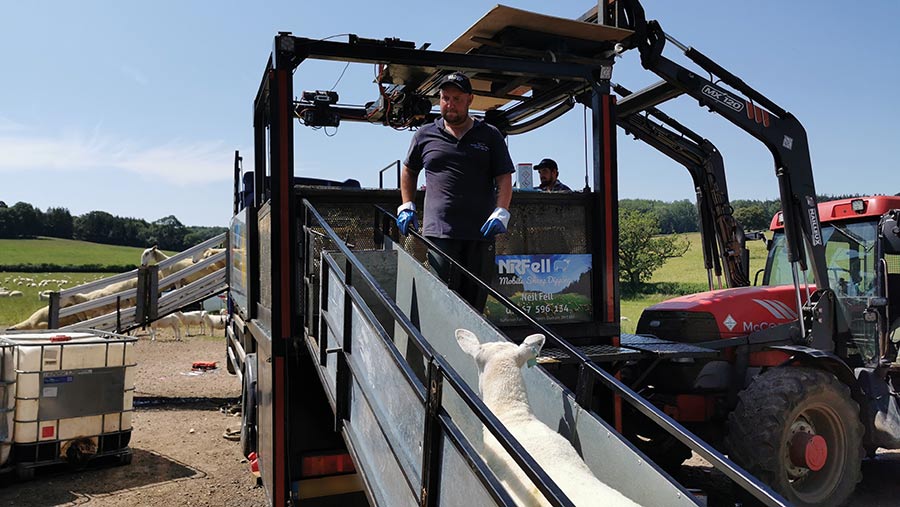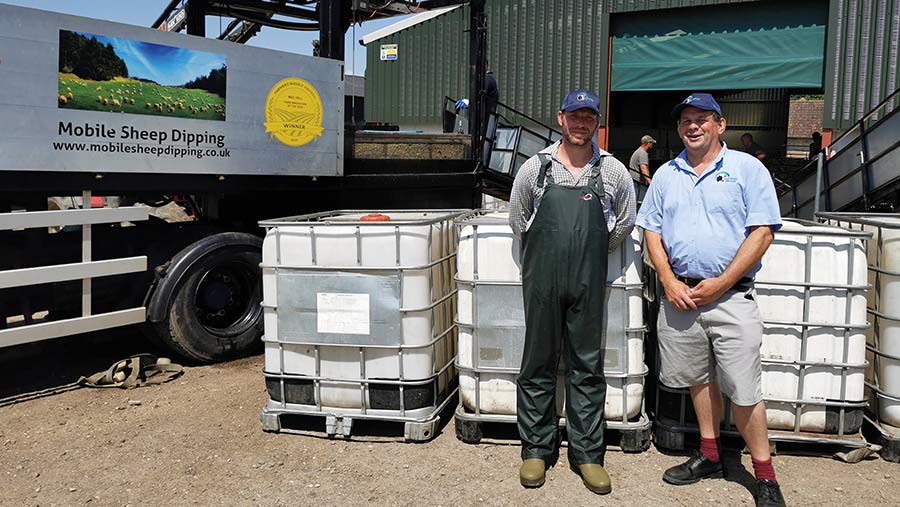Video: Farmers plunge dip a mammoth 6,300 sheep in one day
 © MAG/Philip Case
© MAG/Philip Case Sheep farmers and contractors have carried out a mammoth 6,300-ewe plunge dipping day as part of a new joint venture between two businesses.
Neil Fell, owner of NR Fell Mobile Sheep Dipping, travelled with his team of skilled operators from their base in County Durham to Rampisham in Dorset for the marathon sheep dipping day for blowfly control.
Helped by Rampisham Estate’s head shepherd Gareth Beynon, they started work at 3am and battled through one of the hottest days of the year to dip about 6,300 sheep, finishing by 2pm.
See also: Video: Business flourishes with bespoke sheep-dipping crate

Neil Fell and Andrew Davies © MAG/Philip Case
The sheep were mainly Lleyn cross ewes put to an Innovis Aberfield ram to produce an Aberfield ewe that will perform on any ground.
The day was held as part of a joint venture between Synergy Farm Health, the UK’s largest independent farm animal veterinary practice, and NR Fell Mobile Sheep Dipping.
The partnership has led to the commission and delivery of a new state-of-the-art sheep dipping lorry, which offers mobile plunge dipping to flocks across the South West and Wales.
Watch the video to hear about their key concerns when undertaking such an operation.
Mr Fell said: “We knew we were bringing the new wagon to Dorset and, with Gareth having the set-up and the number of sheep, we thought he would be ideal.
“Originally, we didn’t think about dipping this many sheep. But I rang Gareth and asked him if he’d be interested in doing everything the same day.
“We saved on labour by having the two lorries here. The sheep run better because they are in and out twice as quickly and not staying in their pens as long.”
The new jointly owned truck incorporates a plunge dipper, which is hydraulically controlled, to ensure gradual, smooth dipping of sheep.
Biggest mob of the day today getting brought in ready to dip, 2400 ewes pic.twitter.com/zO7SchpDfM
— Neil Fell dipper man (@NeilFell2) July 19, 2021
Minimal handling
The process, with minimal handling and stress to the animal, ensures the dip has time to ingress into the fleece whether dipping prior to sale or to bring relief to flocks suffering the torments of sheep scab.
Sheep are plunged for one minute and fully submerged for around one second at least twice within that minute, which gives full coverage for the summer months.
Gold Fleece Sheep Dip is used as it treats all parasites, for example blowfly strike, ticks, keds and lice – and most importantly, sheep scab. The service includes the removal of all excess dip from site and licensed disposal.
Mr Fell was awarded the Farmers Weekly Innovator of the Year award in 2019 for his mobile sheep plunge invention amid a worrying revival of scab issues among British flocks.
Since then, Mr Fell says his business has been “flat out” with orders. He estimates that he and his team dip up to half a million sheep a year.
There would appear to be no let-up this summer either, with plans for even larger sheep dipping days at two estates on the Scottish Borders, with 8,000 and 12,000 ewes respectively.
Sheep scab on the rise
Andrew Davies, managing director of Synergy Farm Health, said sheep scab is a very serious disease that many of his clients were struggling to control.
It is a form of allergic dermatitis caused by infestation of the skin surface with the scab mite Psoroptes ovis, and can lead to weight loss, failure to gain weight correctly, and in extreme cases, death.
The disease was almost eliminated in flocks until the compulsory order to dip sheep in organophosphates was ended in 1992. It costs the UK sheep industry an estimated £70m-£200m a year.
According to Mr Fell, farmers are becoming more aware of the serious welfare issue of sheep scab affecting flocks, but there has been a steady increase in incidence in recent years.
“When I started contract dipping in 2014, if I had been sent to a farm with an itch reported, about one in nine cases would have had a scab problem,” he explained. “Fast-forward to 2021 and I reckon it’s about one in three.”
Mr Fell believes the closure of abattoirs and marts is a key factor, as more sheep are being moved from certain hotspots in the country.
